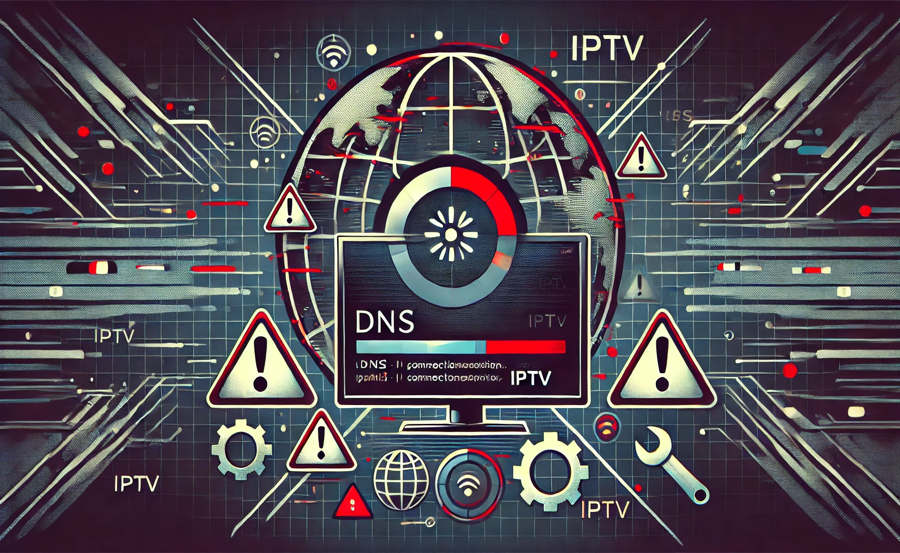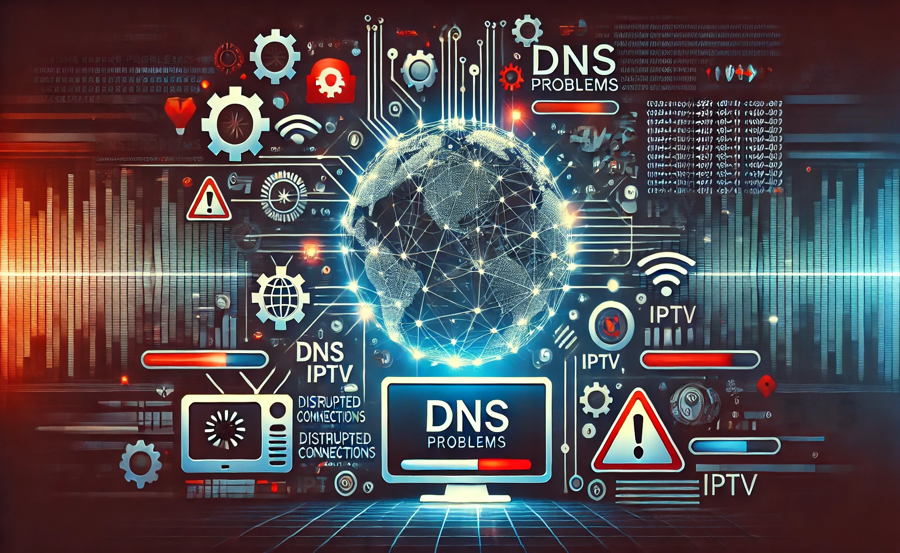DNS (Domain Name System) is an essential component of IPTV (Internet Protocol Television) streaming, responsible for resolving domain names into IP addresses to connect devices to servers. While DNS can enhance IPTV performance, users often encounter issues that disrupt streaming. In this guide, we’ll explore the most common DNS problems IPTV users face and provide actionable solutions to fix them. want Buy 1 Year IPTV Subscription
Common DNS Problems with IPTV
1. DNS Server Not Responding
This issue occurs when your device fails to connect to the configured DNS server. It can result from server downtime, incorrect DNS settings, or ISP restrictions.
Symptoms:
- Error message: “DNS server not responding.”
- IPTV app fails to load channels or playlists.
How to Fix:
- Check your internet connection to ensure it’s stable.
- Switch to a different DNS provider (e.g., Google DNS:
8.8.8.8,8.8.4.4). - Restart your router and device to refresh the connection.
- Ensure DNS settings are correctly configured on your router or device.
2. Slow DNS Resolution
Slow DNS resolution leads to delays in loading channels or streaming content, causing buffering and interruptions.
Symptoms:
- IPTV channels take longer to load.
- High buffering during playback.
How to Fix:
- Use a faster DNS provider like Cloudflare DNS (
1.1.1.1) or Google DNS. - Clear the DNS cache on your device:
- Windows: Run
ipconfig /flushdnsin Command Prompt. - macOS: Use the terminal command
sudo dscacheutil -flushcache; sudo killall -HUP mDNSResponder. - Android/iOS: Restart the device or toggle airplane mode.
- Windows: Run
- Test DNS speed with tools like Namebench and switch to the fastest option.
3. Geo-Restricted Content Access Issues
IPTV services often restrict content based on your location, blocking access to certain channels or playlists.
Symptoms:
- Error: “Content not available in your region.”
- Unable to access certain IPTV channels.
How to Fix:
- Use a Smart DNS service (e.g., Smart DNS Proxy) to bypass geo-restrictions without compromising speed.
- Switch to a VPN (Virtual Private Network) for enhanced anonymity and access to blocked content.
- Configure DNS settings on your router to apply changes network-wide.
4. Frequent Disconnections
Unstable DNS servers can cause IPTV services to drop connections frequently, disrupting your viewing experience.
Symptoms:
- IPTV channels stop abruptly.
- The app disconnects and requires frequent restarts.
How to Fix:
- Use reliable DNS providers with high uptime (e.g., Quad9:
9.9.9.9). - Test multiple DNS servers to find the most stable one for your location.
- Restart your router to reset the connection and reduce network congestion.
5. Incorrect DNS Configuration
Improper DNS setup can prevent IPTV apps from working altogether, as they fail to resolve server addresses.
Symptoms:
- IPTV app shows “Unable to connect to server.”
- Channels fail to load despite a working internet connection.
How to Fix:
- Double-check the DNS addresses entered in your device settings.
- Revert to default settings, then reconfigure DNS correctly.
- Update your IPTV app to the latest version, as outdated software may not support custom DNS.
6. DNS Hijacking

Some ISPs hijack DNS queries to redirect traffic, interfering with IPTV services and affecting performance.
Symptoms:
- Redirects to unwanted pages instead of IPTV servers.
- Slow or unstable IPTV connections.
How to Fix:
- Use a secure DNS provider like Cloudflare DNS or Quad9 DNS to protect against hijacking.
- Consider encrypting DNS traffic with DNS-over-HTTPS (DoH) or DNS-over-TLS (DoT), supported by services like Cloudflare.
7. Incompatibility with IPTV Devices
Some DNS servers may not work well with specific IPTV devices or apps due to compatibility issues.
Symptoms:
- IPTV app fails to recognize DNS changes.
- Channels don’t load despite correct DNS configuration.
How to Fix:
- Choose a DNS provider known for IPTV compatibility, such as OpenDNS.
- Configure DNS at the router level to ensure compatibility across all devices.
- Test your setup with a different IPTV app or device to confirm the issue.
8. ISP DNS Throttling
ISPs may intentionally slow down DNS traffic for IPTV services, causing buffering and slow channel loading.
Symptoms:
- Frequent buffering during streaming.
- Reduced streaming quality at peak times.
How to Fix:
- Use a DNS service like Smart DNS Proxy to bypass ISP throttling.
- Switch to a VPN to mask your IPTV activity from your ISP.
- Contact your ISP to inquire about throttling policies and consider upgrading your plan.
9. DNS Cache Issues
Cached DNS entries can lead to outdated or incorrect information, causing problems with IPTV server connections.
Symptoms:
- Channels fail to load intermittently.
- New playlists or channels don’t appear.
How to Fix:
- Clear DNS cache on your device or router.
- Restart your device and router to refresh the connection.
- Update IPTV playlist files to ensure they contain the latest server information.
10. Overloaded DNS Servers
Popular free DNS services like Google DNS may experience high traffic, resulting in slower resolution times.
Symptoms:
- Intermittent buffering and delays during streaming.
- Performance issues during peak hours.
How to Fix:
- Switch to a less congested DNS provider like Cloudflare or Quad9.
- Opt for paid DNS services, such as Smart DNS Proxy, for better reliability and speed.
- Monitor performance during different times of the day to identify patterns.
Best Practices to Avoid DNS Problems
- Test Multiple DNS Providers:
- Use benchmarking tools to find the fastest and most reliable DNS server for your location.
- Update Router Firmware:
- Keep your router firmware up to date to ensure compatibility with DNS settings.
- Use DNS Encryption:
- Protect against hijacking and ISP interference by enabling DNS-over-HTTPS (DoH) or DNS-over-TLS (DoT).
- Set DNS at the Router Level:
- Configure DNS on your router to apply settings to all connected devices, reducing manual configuration efforts.
Recommended DNS Providers for IPTV
- Google Public DNS:
- Free and widely used (
8.8.8.8,8.8.4.4).
- Free and widely used (
- Cloudflare DNS:
- Prioritizes speed and privacy (
1.1.1.1,1.0.0.1).
- Prioritizes speed and privacy (
- Quad9 DNS:
- Focuses on security and malware blocking (
9.9.9.9).
- Focuses on security and malware blocking (
- Smart DNS Proxy:
- Best for unblocking geo-restricted IPTV content (subscription required).
- OpenDNS:
- Offers security and customization options (
208.67.222.222,208.67.220.220).
- Offers security and customization options (
Conclusion
DNS plays a vital role in optimizing IPTV performance, but it can also be a source of common issues. By understanding these problems and applying the solutions outlined here, you can ensure a smooth and reliable IPTV experience. From switching to faster DNS servers to clearing caches and encrypting DNS traffic, these steps will help you resolve DNS issues effectively and enjoy uninterrupted streaming.
How to Setup IPTV for Live Cooking Shows


